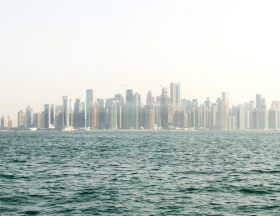On the occasion of the World Refugee Day, Ecomnews Med shares with you a video where FEMISE interviewed a number of different experts on the issue. How did refugees live this difficult year because of the Covid 19 pandemic? How did they access the medical and education services in the host communities? What are the best ways to integrate refugees in the host community? See the experts sharing their thoughts : Maryse Louis, General Manager FEMISE Association, Hasan Mohammed, Protection Officer (Community Based), UNHCR Jordan, Shereen Shaheen, Director of Programme, West Asia-North Africa Institute (WANA), Zeina Jadaan, Head of Education, Civil Society Network for Displacement Country Coordinator, UNHCR Amman; and Jacqueline Wahba, OBE, Professor of Economics, University of Southampton.
World Refugee Day is an international day established by the United Nations to honor refugees around the world. It is celebrated annually on June 20 to foster empathy and understanding for the plight of refugees and to highlight their ability to withstand hardship and rebuild their lives.
Millions of people have already been forced to flee their homes due to persecution, conflict and human rights violations. And according to the UN High Commissioner for Refugees (UNHCR), the coronavirus pandemic and existing or new conflicts have “dramatically affected their conditions.
That figure of 80 million uprooted people is likely to “continue to rise unless world leaders stop the wars,” said High Commissioner Filippo Grandi.
“While forced displacement has doubled over the past decade, the international community is failing to keep the peace,” Grandi added, in a statement.
At the beginning of this year, 79.5 million people were uprooted worldwide. Among them were more than 45 million internally displaced people, 29.6 million refugees and more than 4 million asylum seekers.
“Today we are again passing a dark milestone and this rise will continue unless world leaders stop the wars,” the UNHCR chief argued.
Impact on refugees of measures to curb the spread of Covid-19
Despite the UN Secretary-General’s urgent call in March for a global ceasefire during the pandemic, conflict and persecution continue, the UN agency said. New people have been forced to flee their homes in countries such as Syria, Mozambique, Somalia, the Democratic Republic of Congo (DRC) and Yemen.
New and significant displacement has also been recorded across the central Sahel region of Africa, as civilians suffer unspeakable violence, including rape and killings. “While forced displacement has doubled in the past decade, the international community is failing to keep the peace,” Grandi said.
In addition, the report notes that some of the measures taken to curb the spread of Covid-19 have made it more difficult for refugees to reach safety.
At the peak of the first wave of the pandemic last April, 168 countries had fully or partially closed their borders and 90 countries made no exceptions for asylum seekers.
For uprooted people, the Covid-19 pandemic ultimately became “an additional protection and livelihood crisis” beyond the public health emergency worldwide.
According to the Geneva-based UN agency, the virus has altered all aspects of human life and severely aggravated existing problems for uprooted and stateless people.
Source : UN










Réagissez à cet article